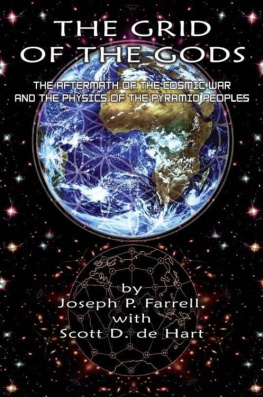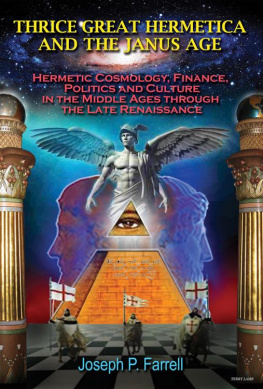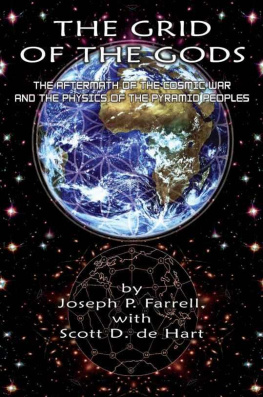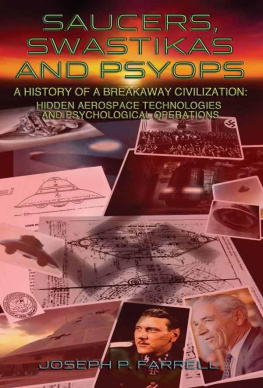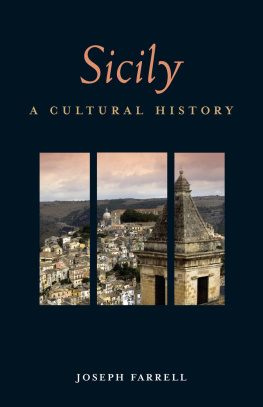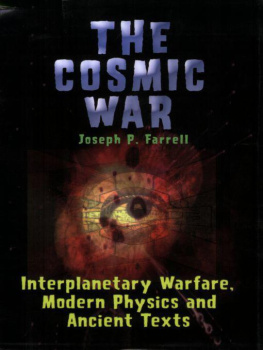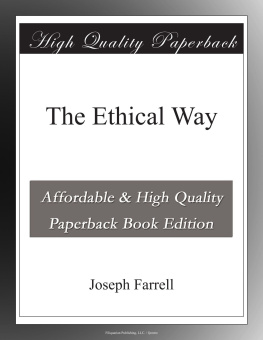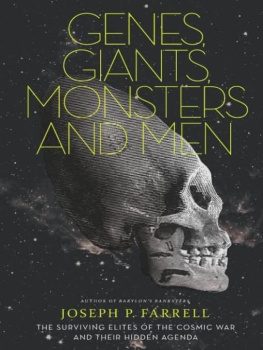Joseph P. Farrell - The Grid of the Gods
Here you can read online Joseph P. Farrell - The Grid of the Gods full text of the book (entire story) in english for free. Download pdf and epub, get meaning, cover and reviews about this ebook. genre: Romance novel. Description of the work, (preface) as well as reviews are available. Best literature library LitArk.com created for fans of good reading and offers a wide selection of genres:
Romance novel
Science fiction
Adventure
Detective
Science
History
Home and family
Prose
Art
Politics
Computer
Non-fiction
Religion
Business
Children
Humor
Choose a favorite category and find really read worthwhile books. Enjoy immersion in the world of imagination, feel the emotions of the characters or learn something new for yourself, make an fascinating discovery.
- Book:The Grid of the Gods
- Author:
- Genre:
- Rating:3 / 5
- Favourites:Add to favourites
- Your mark:
- 60
- 1
- 2
- 3
- 4
- 5
The Grid of the Gods: summary, description and annotation
We offer to read an annotation, description, summary or preface (depends on what the author of the book "The Grid of the Gods" wrote himself). If you haven't found the necessary information about the book — write in the comments, we will try to find it.
The Grid of the Gods — read online for free the complete book (whole text) full work
Below is the text of the book, divided by pages. System saving the place of the last page read, allows you to conveniently read the book "The Grid of the Gods" online for free, without having to search again every time where you left off. Put a bookmark, and you can go to the page where you finished reading at any time.
Font size:
Interval:
Bookmark:

THE GRID
OF THE
GODS
The Aftermath of the
Cosmic War and the Physics
of the Pyramid Peoples
Other Books by Joseph P. Farrell:
LBJ and the Conspiracy to Kill Kennedy
Roswell and the Reich
Nazi International
Reich of the Black Sun
The S.S. Brotherhood of the Bell
Secrets of the Unified Field
The Cosmic War
The Giza Death Star
The Giza Death Star Deployed
The Giza Death Star Destroyed
THE GRID
OF THE
GODS
Joseph P. Farrell
with Scott D. de Hart

Adventures Unlimited Press
The Grid of the Gods
Copyright 2011
by Joseph P. Farrell and Scott D. de Hart
ISBN: 978-1-935487-39-5
All Rights Reserved
Published by:
Adventures Unlimited Press
One Adventure Place
Kempton, Illinois 60946 USA
www.adventuresunlimitedpress.com
Cover by Joe Boyer
10 9 8 7 6 5 4 3 2 1
Above all, to
Scott Douglas de Hart:
A true master, adept, and poet of deep mysteries, who crossed the Rubicon with me:
Anything I could say, any gratitude I could express, are simply inadequate for you;
You are a true

Thank you seems so completely inadequate.
To George Ann Hughes:
Dear and good friend:
You are a constant encouragement; thank you, but again, it seems so inadequate.
And to
Tracy S. Fisher :
You are, and will always be, sorely missed;
This is meant to be only an essay. It is a first reconnaissance of a
realm well-nigh unexplored and uncharted. From whichever way one
enters it, one is caught in the same bewildering circular complexity, as
in a labyrinth, for it has no deductive order in the abstract sense, but
instead, resembles an organism tightly closed in itself, or even better,
a monumental Art of the Fugue.
Giorgio de Santillana and Hertha von Dechend,
Hamlets Mill: An Essay on Myth and the Frame of Time, p. 1.
...we are speaking about an intelligent geometric pattern into which,
theoretically, the Earth and its energies are organized and possibly
in which the ubiquitous ancient megalithic sites are also positioned.
David Hatcher Childress,
Anti-Gravity and the World Grid, p. 5.
Thus, while the mute creation downward bend
Their sight, and to their earthly mother tend,
Man looks aloft; and with erected eyes
Beholds his own hereditary skies.
Ovid,
Metamorphoses, Book I,
trans. John Dryden, Alexander Pope, Joseph Addison, William
Congreve, et al., p. 6.
T ABLE OF C ONTENTS
P ART T WO :
T HE M ESO-AND S OUTH -A MERICAN P YRAMID P EOPLES
P ART T HREE :
T HE M ESOPOTAMIAN P YRAMID P EOPLES :
T HE P YTHAGOREAN AND P LATONIC P RINCIPLES OF S UMER ,
B ABYLONIA, AND G REECE
P ART F OUR :
T HE P REMIER P YRAMID P EOPLES : T HE E GYPTIANS
P ART F IVE :
T HE P HYSICS OF THE P YRAMID P EOPLES
ACKNOWLEDGEMENTS
It would be impossible for me to thank all the people who have made this book possible, for it would include the many readers who have so graciously contributed donations to my website, donations that made the assembly of much of the research presented herein possible. Without them, this book simply would not exist. To them, I can only say an inadequate thank you, with the hope that they know it is accompanied by heartfelt prayers and good wishes for them, in every thing and circumstance.
I also owe thanks to my publisher, David Hatcher Childress, for taking a chance on this book sight unseen! and for so generously affording me the advance and the time to do it. Indeed, without his own personal explorations and publications on the mysteries of ancient technology and the world grid, this book again would not have seen the light of day.
Thanks must also go to my friend, Richard C. Hoagland, who many years ago shared his knowledge of one source utilized herein H.S.M. Coxeters Regular Polytopes in a lecture given at the United Nations. Without his willingness to share and discuss ideas others deem to be taboo, again, this book would not have seen the light of day.
But always and above all, my deepest gratitude goes to my co-author on this book, my friend and brother of so many, many years, Dr. Scott D. de Hart, in deep thanks for all the years of many stimulating conversations, many of whose contents and subjects of discussion are reflected here, and for his undying friendship and persistent and consistent brotherhood and encouragement:
Thank you, thrice over, my friend.
Joseph P. Farrell
2011
FOREWORD
BY
SCOTT D. DE HART, PH.D.
Why are we here? How did we get here? Who put us here? These questions have occupied the minds of the greatest philosophers and theologians through the ages, but they have also echoed in the minds of the most simple man or woman born. One can safely arrive at the conclusion that if the answer had ever been infallibly set forward, the question would cease to be asked. Surely, it is not that answers have not been produced, nor that some of the answers did not attract commanding audiences, but the question remains because each person born must ask the question again and find an answer that is personally acceptable. According to the sixteenth century French Reformer, John Calvin, our wisdom, in so far as it ought to be deemed true and solid wisdom, consists almost entirely of two parts: the knowledge of God and of ourselves. Consequently, if it is a personal knowledge that is to be deemed true knowledge, (or at least a fraction of true knowledge) the question will be asked over and over with the birth of each person. But where is one to turn for an answer?
It might be thought absurd to suggest that a finite being can ever reach an infallible answer concerning a question of this magnitude but this barrier of human limitation has never hindered the best efforts of men to strive for it. The most apparent relic from this search for an answer is found in religious practice and belief. These two giants stand as twin pillars in a temple of wisdom erected by previous generations of knowers . They have a voice, a message it is not breathing though it is living and memorialized in stone, symbols, writings, and perpetually acted out within the sacred temples scattered across the earth.
This urge to know has long been associated with pilgrimages to sacred sites, the study of sacred texts, meditation or prayer in the hallowed space. Such a pilgrimage is exactly what led me to Chichen Itza, a Mayan ruin in the Yucatan Peninsula. On a dark and rainy day I stood in the shadow of that pyramid and literally felt a pulse of the universe passing through my body, an eerie and foreboding energy flooded over me as I beheld the serpents and skulls staring at me, judging me, calling me to acknowledge their presence. Within the Great Ball Court with its circular stones and the winding serpent tails surrounding it, I heard my own voice echoing across the open field, a mingling of voices from the past making a haunting chorus and opening up a portal that is difficult to describe. My inability to put this experience into words is the purpose of this book by Dr. Farrell.
What is the Temple but an earthly copy of a higher idea? What is the ritual of that temple but the best human effort to cross over, to unite, consummate, die, and be reborn? It is the story told in the arrangement of the furniture; the placement of the altar; the ascent of the steps; even the very geographic and directional positioning. Heavenly alignments are mirrored on earth and ritualistically carried out by those who inherited fragments of the answers to those eternally nagging questions. Could there have been architects of the gods? Is it possible that the placement, patterns, symbols and rituals, are not earthly constructions but rather sacred re-constructions that unlock the door that mankind has been knocking at for thousands and thousands of years? Is it also possible that a tradition exists of those in the know who built, symbolized, ritualized, and initiated chosen disciples to carry on the message and pass along the sacred inheritance? The answer presented herein is a resounding yes! What happens on earth is not necessarily earthly and the rituals of times past or present are more than re-enactments, they are portals to understanding.
Next pageFont size:
Interval:
Bookmark:
Similar books «The Grid of the Gods»
Look at similar books to The Grid of the Gods. We have selected literature similar in name and meaning in the hope of providing readers with more options to find new, interesting, not yet read works.
Discussion, reviews of the book The Grid of the Gods and just readers' own opinions. Leave your comments, write what you think about the work, its meaning or the main characters. Specify what exactly you liked and what you didn't like, and why you think so.

